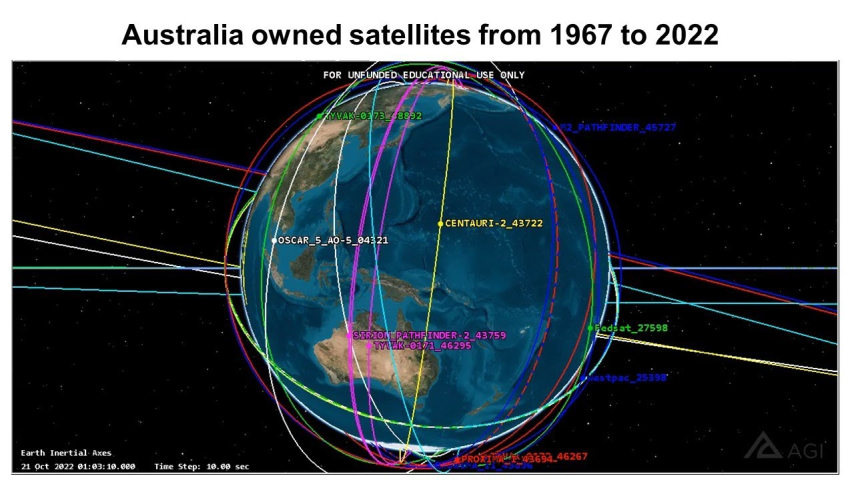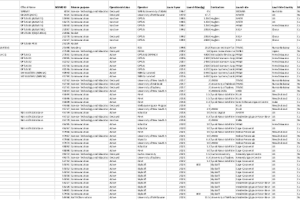
My Expertise
Guidance Navigation and Control
Data fusion/Kalman filer design
Space system engineering
System modular analysis
System trade space exploration
Keywords
Fields of Research (FoR)
Systems engineering, Decision making, Navigation and position fixing, Navigation and Position Fixing, Aerodynamics, Automation and Control Engineering, Pattern Recognition and Data MiningSEO tags
Biography
Senior Lecturer in Space Systems Engineering at the School of Engineering and Technology (SET), UNSW Canberra campus
Lily completed her PhD in Guidance Navigation and Control in 2011, including a study exchange at the School of Surveying and Spatial Information Systems at the University of New South Wales, Sydney.
Before joining UNSW Canberra, she was research associate at the Australian Centre for Space Engineering Research (ACSER) at UNSW...view more
Senior Lecturer in Space Systems Engineering at the School of Engineering and Technology (SET), UNSW Canberra campus
Lily completed her PhD in Guidance Navigation and Control in 2011, including a study exchange at the School of Surveying and Spatial Information Systems at the University of New South Wales, Sydney.
Before joining UNSW Canberra, she was research associate at the Australian Centre for Space Engineering Research (ACSER) at UNSW Sydney from 2011 to 2014, working for the design of Garada Earth Observation Mission and EC0 CubeSat Mission. Then, she joined as a research associate at the Capability System Centre, School of Engineering and IT, University of New South Wales, Canberra. In 2018, she was promoted to lecturer. In 2023, she has been promoted to Senior Lecturer.
Lily's teaching spans postgraduate and undergraduate. She mainly engaged in PG teaching for UNSW Canberra Space Master Education Program since she is the course convenor for ZEIT8008 Space Systems Design, and ZEIT8009 Global Navigation Satellite System (GNSS). For undergraduates, she is convenor of the course ZEIT4227 Radar Technology and Application. She has chaired the Space Panel of UG students' Final Year Project from 2022–2023.
Her research interests lie in space engineering systems design, and applying AI/CI based computational system engineering analysis methods on include, but not be limited to, space systems. Her area covers a wide range of topics, including autonomous spacecraft navigation based on Global Navigation Satellites System (GNSS) and celestial navigation, spacecraft attitude determination and control, tradespace exploration, system modular analysis, etc. She has published over 50 articles in peer-reviewed conferences and journals. She has two PhD students to complete, and currently has six PhD students under supervision. You can view her Google Scholar profile here.
She has been an organisation committee member for the Australian Space Research Conference since 2022, and has served as Deputy Chair of the Program Committee in 2023 and Chair of the Program Committee since 2024. She is an IEEE senior member, and her current volunteer roles are IEEE Australian Capital Territory (ACT) Section Vice Chair and the Aerospace Electronic Systems Society (AESS) chapter at the ACT Section.
Ph.D. scholarships ($35,000 per year) are available for high-achieving students (with H1/High Distinction in UG and/or Masters by Research) under my supervision. If you are interested, please feel free to get in contact with me. A self-assessment tool is available to get a general feel for your competitiveness. You need to meet the English language requirements. If you are eligible and interested in working on the listed PhD projects below (or closely related) topics or keywords, please send me your CV, academic transcripts, the result of the self-assessment, and a research proposal (less than 5 pages). Your research proposal should contain your research problems (what do you want to do), motivation (why do you want to do this), a brief review of the most relevant literature (what have you already known), proposed methodology (how to do) and expected outcome (what do you want to achieve). For more information, please refer to the following links on how and when to apply for a research degree. You can seek my advice/help during the construction of your Research Proposal.
My Grants
Internal:
- UNSW Career Advancement Fund for Female Academics July 2018- May 2020
- Tradespace Exploration SEIT SFRG 2022
- Smart Mission Design , SET SFG 2024
My Qualifications
Qualifications
- PhD in Guidance, Navigation and Control (GNC), Nanjing University of Aeronautics and Astronautics (NUAA), 2011.
Certificate
- Certificate of Completion with Merit from Graduate Teaching Training Program UNSW Canberra. Feb - Jun 2015
- Certificate of Completion from Fundations of University Learning and Teaching (FULT) Program 2019
- National Mental Health First Aid certificate, 2019 - 2021
- UNSW Course Design Institute, September 2023
My Awards
My Research Activities
Research interests
- Spacecraft autonomous navigation/orbit determination based on GNSS, celestial navigation
- Spacecraft attitude determination and control system (ADCS)
- Kalman filter technology
- Space system engineering
- Digital system engineering
My Research Supervision
Supervision keywords
Areas of supervision
Autonomous navigation and orbit control
Satellite orbit and attitude systems design
Space mission orbit design
Data fusion/Kalman filter design for blending multiple sensor inputs
Satellite design trade space exploration
System modular analysis
System complex management
Currently supervising
Scholarships of $35,000 (AUD) are available for PhD students who achieved H1 /High Distinction in their UG program and/or have completed a Masters by Research. If you are interested, contact me.
Currently, I have three PhD student under supervision. The topics are as follows:
- Test and Evaluation of Artificial Intelligence Systems.
- Real-time cybersecurity risk assessment and mitigation platform for national critical infrastructure.
- A dynamic modular approach to system architectures across the Product Lifecycle
My Engagement
- Chair, IEEE Australian Capital Territory (ACT) Section 2024
- Founder and chair of the Aerospace and Electronic Systems Society Chapter in the IEEE ACT section 2022- 2024
- President of Women in Space Chapter (WiSC) of National Space Society of Australia (NSSA) http://wisc.nssa.com.au/
- Senior Member of the Institute of Electrical and Electronics Engineers (IEEE) 2024
- Executive committee member of IEEE Australian Capital Territory (ACT) Section, ADFA Students Councillor. 2020-2023
- UNSW Canberra representative of Women in Research Network since 2021 (147 members and 35 in Canberra) 2020-2023
My Teaching
- Space Systems Design - ZEIT8008
- Global Navigation Satellite Systems (GNSS) - ZEIT8009
- Radar Technology and Application - ZEIT4227
Location
Room 204, Level 2, Building 16 at UNSW Canberra
Map reference (Google map)
Contact
Publications
ORCID as entered in ROS
Research Activities
Welcome to the UNSW Canberra Space Education Seminars
Our Space Education Seminars have become one of the cornerstones of the academic experience at UNSW Canberra, uniquely designed to bridge theoretical knowledge with real-world applications in space engineering and operations. These enriching sessions are a part of our commitment to integrating hands-on, practical insights into our curriculum.
Initiated in 2020 by Dr. Lily Qiao as part of a single course, the education seminars have been running…
Until December 2023, Australia possessed a total of 52 space objects, comprising 50 satellites and 2 rocket bodies.
This study presents an analysis of historical data on all Australia-owned satellites launched since 1967, starting with the inaugural Australian satellite, "WRESAT." Data was collected from various space catalogs and databases, including some based on orbital software data files and others referenced by satellite operators. It's important to note that the resulting dataset on Australian spacecraft is informative but not authoritative. This…
Videos




